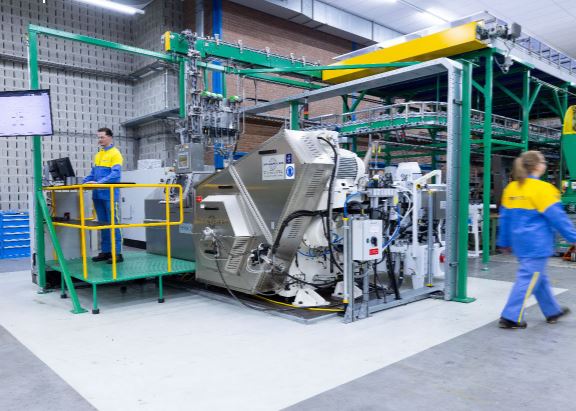Tata Steel Nederland launches high-speed, energy-efficient can production line
by David Fleschen

Tata Steel Nederland has commissioned a new, advanced can manufacturing line at its research and development facilities. The new machine, referred to as a “bodymaker,” employs a dry forming process to produce steel food cans and is capable of operating up to 25% faster than standard industry equipment. With this development, the company continues to advance its position in sustainable and high-efficiency steel packaging technologies.
Dry Forming Process Reduces Energy and Costs
Unlike traditional can manufacturing methods—which involve stamping steel discs and stretching them into cylindrical shapes, generating frictional heat that requires water cooling and subsequent washing—the new line uses a dry forming technique. This approach eliminates the need for emulsified water, thereby reducing energy consumption and lowering capital investment requirements for customers.
The breakthrough is made possible through the use of Protact®, a polymer-coated steel developed by Tata Steel. This material reduces friction during forming and removes the need for conventional lacquer coatings. “The polymer layer ensures compliance with future food safety standards,” said Hans van der Weijde, Director of Research and Development at Tata Steel Nederland. “It also eliminates the need for internal lacquering, which is gradually being phased out due to regulatory trends.”
Increased Efficiency and Customer Collaboration
Operating at speeds of up to 400 cans per minute—compared to the industry average of 320—the new line represents a 25% increase in production output. Tata Steel uses the installation as a proof-of-concept facility, allowing customers to experience the dry forming process under real industrial conditions.
“Customer collaboration is essential,” said Joris Essing, Marketing Manager for Packaging Steel. “We bring expertise in dry forming, but successful adoption depends on how well customers integrate the technology into their own production lines. This demands close cooperation.”
One example of such collaboration is the partnership with Spanish food company Grupo Calvo. The two firms jointly developed a new tuna can using Protact® that requires less oil for product preservation, makes it easier to remove the contents, and allows for lighter packaging—offering logistical and sustainability benefits.
Focus on Innovation and Circularity
The new production line underscores Tata Steel Nederland’s broader focus on innovation and its commitment to reducing the environmental footprint of steel packaging. By eliminating water-intensive steps and enabling more efficient materials usage, the company aims to set new benchmarks in the circular economy for packaging.
Tata Steel continues to position itself not only as a materials supplier, but also as a technology partner for packaging manufacturers seeking to modernize their processes in line with evolving environmental and regulatory expectations.
Source and Photo: Tata Steel Nederland

